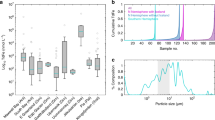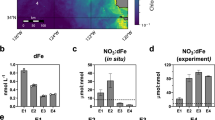Abstract
THE 'iron hypothesis'1,2 states that phytoplankton growth and biomass are limited by low concentrations of available iron in large regions of the world's oceans where other plant nutrients are abundant. Such limitation has been demonstrated by experiments in which iron has been added to both enclosed and in situ (un-enclosed) phytoplankton populations2–6. A corollary of the iron hypothesis is that most 'new' iron is supplied by atmospheric deposition7,8, and it has been suggested that changes in the deposition rates of iron-bearing dust have led to changes in biological productivity and, consequently, global climate7. Here we report surface-water measurements in the equatorial Pacific Ocean which show that the main iron source to equatorial waters at 140° W is from upwelling waters. Shipboard in vitro experiments indicate that sub-nanomolar increases in iron concentrations can cause substantial increases in carbon export to deeper waters in this region. These findings demonstrate that equatorial biological production is controlled not solely by atmospheric iron deposition, but also by processes which influence the rate of upwelling and the iron concentration in upwelled water.
This is a preview of subscription content, access via your institution
Access options
Subscribe to this journal
Receive 51 print issues and online access
$199.00 per year
only $3.90 per issue
Buy this article
- Purchase on Springer Link
- Instant access to full article PDF
Prices may be subject to local taxes which are calculated during checkout
Similar content being viewed by others
References
Geider, R. J. & LaRoche, J. Photosynth. Res. 39, 275–301 (1994).
Martin, J. H. et al. Nature 371, 123–129 (1994).
Martin, J. H. & Fitzwater, S. E. Nature 331, 341–343 (1988).
Coale, K. H. Limnol. Oceanogr. 36, 1851–1864 (1991).
Johnson, K. S., Coale, K. H., Elrod, B. A. & Tindale, N. W. Mar. Chem. 46, 319–334 (1994).
Kolber, Z. S. et al. Nature 371, 145–149 (1994).
Martin, J. H. Paleoceanography 5, 1–13 (1990).
Leinen M. & Murray, J. W. (eds) A Rationale and Plan for U.S. Joint Global Ocean Flux Studies in the Central Equatorial Pacific, Problem II, Hypothesis 2. (USJGOFS Planning & Coordination Office, Woods Hole Oceanographic Instn, Woods Hole, MA 1990).
Bruland, K. W., Franks, R. P., Knauer, G. A. & Martin, J. H. Analytica chim. Acta 105, 233–245 (1979).
Eggiman, D. W. & Betzer, P. R. Analyt. Chem. 48, 866–890 (1976).
Duce, R. A. & Tindale, N. W. Limnol. Oceanogr. 36, 1715–1726 (1991).
Tsuchiya, M., Lukas, R., Fine, R. A., Firing, E. & Lindstrom, E. Prog. Oceanogr. 23, 101–147 (1989).
Herzig, P. et al. Eos 75, 513–515 (1994).
Sudarikov, S. M., Davydov, M. P., Bazelyan, V. L. & Tarasov, V. G. in Hydrothermal Vents and Processes (eds Parson, L. M., Walker, C. L & Dixon, D. R.) 249–255 (Spec. Publ. No. 87, Geological Soc., Bath, UK, 1995).
Exon, N. F. & Cronan, D. S. Mar. Geol. 52, M43–M52 (1983).
Morel, F. M. M., Hudson, R. J. M. & Price, N. M. Limnol. Oceanogr. 36, 1742–1755 (1991).
Murray, J. W., Barber, R. T., Roman, M. R., Bacon, M. P. & Feely, R. A. Science 266, 58–65 (1994).
Banse, K. Limnol. Oceanogr. 36, 1886–1878 (1991).
Fitzwater, S. E., Coale, K. H., Gordon, R. M., Johnson, K. S. & Ondrusek, M. E. Deep-Sea Res. (in the press).
Price, N. M., Ahner, B. A. & Morel, F. M. M. Limnol. Oceanogr. 39, 520–539 (1994).
Takeda, S. & Obata, H. Mar. Chem. 50, 219–241 (1995).
Rue, E. & Bruland, K. W. Eos 26, OS154 (1996).
Green, R. M., Kolber, Z. S., Swift, D. G., Tindale, N. W. & Falkowski, P. G. Limnol. Oceanogr. 39, 1060–1074 (1994).
Lindley, S., Bidigare, R. & Barber, R. T. Deep-Sea Res. (in the press).
Coale, K. H. & Buland, K. W. Limnol. Oceanogr. 32, 189–200 (1987).
Bruland, K. W. & Coale, K. H. in Dynamic Processes in the Chemistry of the Upper Ocean, (eds Burton, J. D., Brewer, P. G. & Chesselet, R.) 159–172 (Plenum, New York, 1986).
Gargett, A. E. Limnol. Oceanogr. 36, 1527–1545 (1991).
Bryden, H. L. & Brady, E. C. J. phys. Oceanogr. 15, 1255–1273 (1985).
Peters, H., Gregg, M. C. & Toole, J. M. J. geophys. Res. 93, 1199–1218 (1988).
Sanderson, M. & Bruland, K. Eos 76, OS177 (1996).
Author information
Authors and Affiliations
Rights and permissions
About this article
Cite this article
Coale, K., Fitzwater, S., Gordon, R. et al. Control of community growth and export production by upwelled iron in the equatorial Pacific Ocean. Nature 379, 621–624 (1996). https://doi.org/10.1038/379621a0
Received:
Accepted:
Issue Date:
DOI: https://doi.org/10.1038/379621a0
This article is cited by
-
Equatorial Pacific dust fertilization and source weathering influences on Eocene to Miocene global CO2 decline
Communications Earth & Environment (2023)
-
Persistent equatorial Pacific iron limitation under ENSO forcing
Nature (2023)
-
Impact of Pacific Ocean heatwaves on phytoplankton community composition
Communications Biology (2023)
-
Siderophores as an iron source for picocyanobacteria in deep chlorophyll maximum layers of the oligotrophic ocean
The ISME Journal (2022)
-
Abundant nitrite-oxidizing metalloenzymes in the mesopelagic zone of the tropical Pacific Ocean
Nature Geoscience (2020)
Comments
By submitting a comment you agree to abide by our Terms and Community Guidelines. If you find something abusive or that does not comply with our terms or guidelines please flag it as inappropriate.



